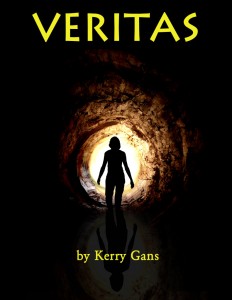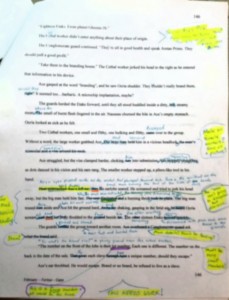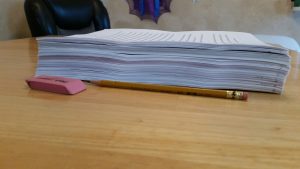What motivates you to do things? Sometimes it is as mundane as necessity, other times it might be a higher ideal like justice. Every single thing we do in our daily lives has a motivation behind it.
Which leads to our characters—everything they do must have motivation pushing them. Some motivations go without saying: someone who is eating is probably hungry, for instance. But an unusual action needs explanation. Why does someone run into a burning building to save someone? Why does someone pay for a stranger’s meal in a restaurant? Those are the motivations readers want to understand.
The same situation will prompt different reactions from different characters. If they find $100 on the street, one might try to find the owner, one might immediately pocket it, and a third might donate it to charity. Their reactions will show the reader what these characters are like at a deeper level—and give a clue to what motivates them.
The overarching motivation for a character should be consistent. Most people are driven by a deep belief that rarely changes. A person is not going to give money to a homeless person one day and kick him the next—and if he does, then that’s a story in itself. A consistent motivation will help ground your character, and therefore your readers.
Of course, many stories are about character change, and as a character changes, what motivates him or her might change, too. A self-absorbed career man motivated by ambition might put ambition aside after having a child, becoming motivated by his love for his child. As their guiding belief changes, their motivation can change, too.
If your characters’ motivations are going to shift from the consistency they had in the beginning of the story, then be sure to let the reader in on the change as it happens. Take them on the journey, let them live the experiences that change your character. That is, after all, the story—and that’s why the readers came.
For many readers, the question that keeps them turning the page is not only “what happens next”—but “why”. Why your character does what they do can fascinate the readers as much as what they are doing. So when you think about your character, think about the “why”—the motivation.
Do you consciously consider character motivation, or does it just flow naturally for you?




Philadelphia Writers’ Conference 2018: My Biggest Takeaway
I’m not talking about plot complexity. Even the simplest story is complex in the way I mean. What I mean is how every element of your story impacts the others. In our character workshops, we also crossed into plot. In our plot workshop we also delved into character. Every word choice and point of view feeds into the elusive element of voice. Everything interconnects, playing off each other and driving the story in different ways.
That same complex interconnection often makes revision a mind-bending project. Change one thing about a character, that can change the plot. Change POV, and your voice skews. Change the language and that might suggest a change in structure. Every change, no matter how minor, flows downstream all the way to the end of the novel. Riding those rapids can exhaust you.
This complexity of story comes from the fact that stories reflect the complexity of life. This helps stories translate across different media. The same story can be told orally, in print, in graphic novels, or on a screen large or small. Although the formats differ, the story fabric can be cut and tailored to each one to convey the same meaning and soul as the original story. The interwoven complexity of story gives it both strength and malleability.
Given the complex nature of writing and all its elements, is it any wonder that the craft of writing is so hard? The work of weaving a tale can take an emotional, psychological, and even physical toll on writers. To combat this, we need connectivity of our own—a network of friends and supporters who understand and can help lift us over the obstacles we encounter. This is one of the values of conferences like the Philadelphia Writers’ Conference. There we meet and connect with other writers and form bonds that last.
Thank you, PWC, for 70 years of helping writers connect so we can weave our stories together.